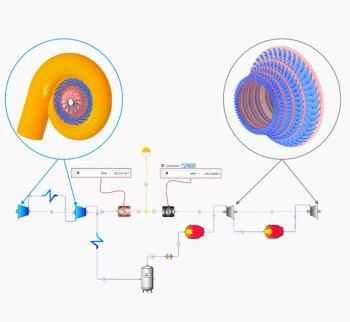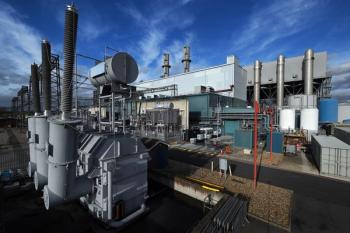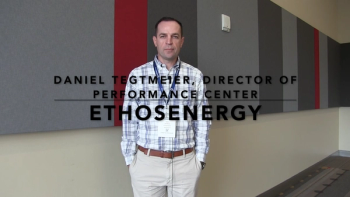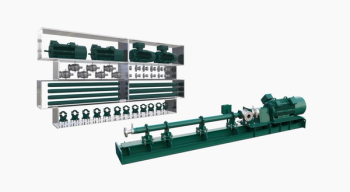
Elliott compressors to be supplied with Tri-Sen control systems
Elliott Group and Tri-Sen Systems (Houston, TX) have entered into a strategic alliance. Moving forward, Tri-Sen control systems will be the standard offering quoted with all Elliott compressors and turbines, in both new project and aftermarket applications. Elliott will offer other control products when appropriate to customer specifications or consistency with existing installations.
“This relationship applies to all compressor models irrespective of driver, whether motor/gear or turbine drive, as well as to our entire line of steam turbines,” said John Rann, Elliott's Vice President and Group Executive responsible for the Tri-Sen alliance. “For our mechanical drive YR and MYR steam turbines for example, we have now adopted Tri-Sen’s TS 300 series digital governor as our standard. Tri-Sen’s control solutions will also be key components of the machinery upgrades and retrofits provided by Elliott’s Global Service organization for the entire range of Elliott and non-Elliott turbomachinery solutions.”
The benefits are mutual. While Elliott will be able to offer Tri-Sen controls for all machines, Tri-Sen gains market presence as the sole provider of controls for Elliott turbomachinery.
“The alliance with Elliott allows us to spend time with their machines and combine the Elliott rotating equipment expertise in our own product development as well as in addressing user issues,” said Bill Barkovitz, President of Tri-Sen Systems.
Previous to the deal, Elliott’s centralized controls engineering group was responsible for taking customer specs and system definition and working out the best configuration. It would then subcontract the panel manufacturing to one of several approved sub-vendors. Each system was a customized adaption of a third party’s platform tailored to a project’s specifications. For larger projects in particular, that level of detail might not get defined until well into the job. This added to the resource requirements of a major project. “As we didn’t have a controls standard, every system was open to interpretation of customer specifications which didn’t lend well to system design efficiency or timely execution,” said Rann.
Further, Elliott’s turbomachinery and global service business units did not operate under a central controls strategy. Each business dealt with its own control requirements and products independently. “We are a turbomachinery manufacturer, not a controls company, yet controls are an inextricable part of the scope of supply,” said Rann. “We realized the need for us to have a strong global controls partner in order to meet the needs and expectations of our customers.”
That led to a thorough review of candidates. The field was narrowed down based on Elliott’s control needs, and the desire to partner with a firm with manufacturing capabilities on a global scale. After more than six months of evaluation, Tri-Sen scored far above the others according to Rann.
Tri-Sen itself began in the late seventies as a maker of governors and gained early recognition for producing the first digital governor. It was part of Invensys between 2003 and 2008 though has been independent for the last four years. Over its history, it has placed thousands of controllers in process plants in every corner of the globe.
Tri-Sen’s comprehensive turbomachinery controls offering ranges from the simple, self-powered configurable TS300, applicable for small non-critical utility turbines, to the “do everything” programmable TSx control system.
Barkovitz described the TSx as a fully programmable turbomachinery controls platform with SIL 3 reliability. It features configurable redundancy, up to quad-redundant, and better than 10ms “screw-to-screw” performance. It also comes standard with advanced diagnostics, a built in HMI with operator graphics, real time and historical trending, alarm management as well as 1ms sequence of events recording
“We are working closely with Elliott to come up with standard configurations and standard ways of project implementation around the TSx,” said Barkovitz. “Typically, controls are an afterthought once the machinery is sold. If we become involved very early in a project, we can do simulations, consult with Elliott and help everyone make better decisions.”
A recent Elliott project offers a case in point. The end user was ready to purchase all the hardware. However, a simulation by Tri-Sen highlighted that the valves were in the wrong location. Instead of an expensive error that would have to be fixed in the field, the drawings were altered to a more workable configuration.
Under the terms of the alliance, the control products of Tri-Sen become part parcel of the Elliott scope of supply. Tri-Sen will configure and manufacture the products and systems, but Elliott will be the interface on controls within its own prime contract. However, Tri-Sen experts will always be on hand to address clarifications in the pre-order and execution phases and to provide support on any issues once the product is in the field.
Elliott Global Service gains a much stronger capability to upgrade and modify aging controls, as well as greater consultative engineering expertise to address control issues. Even if a customer specifies or already has another control system platform, Elliott is happy to adopt that requirement and will collaborate with Tri-Sen to design and implement an enhanced system that aligns the controls philosophy with the interface of the rotating equipment and the specific process requirements,
“The alliance covers new machines and retrofits,” said Barkovitz. “It’s relatively easy to justify a retrofit based on improved operational efficiency and enhancing the controls solution with current technology.”
The Elliott controls group, however, isn’t going away. It has been elevated to a controls center of excellence which will act as a clearing house for all controls requirements for all three business units. This new Elliott entity has a Tri-Sen counterpart.
“Our customers gain as they are not talking separately to either a software company or a turbomachinery company; they can address both in concert,” said Rann. “We also gain from Tri-Sen’s extensive capabilities in control system simulation, training and modeling of process systems, remote monitoring, remote diagnostics and trend monitoring. Our objective was to give our customers the full scope of rotating machinery excellence integrated with advanced turbomachinery controls. Elliott’s alliance with Tri-Sen provides that solution. ”
Newsletter
Power your knowledge with the latest in turbine technology, engineering advances, and energy solutions—subscribe to Turbomachinery International today.




